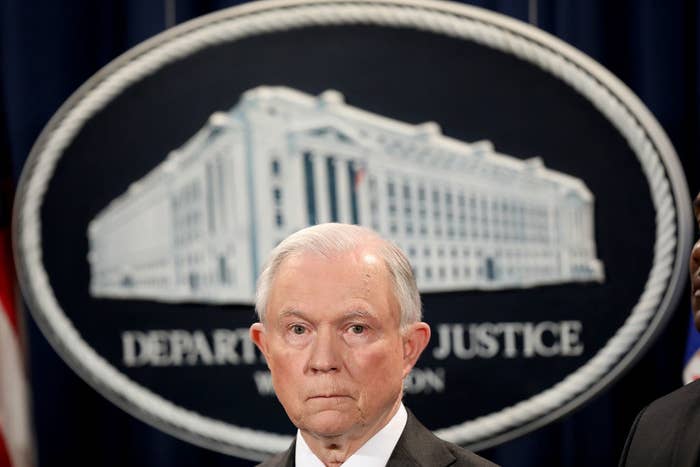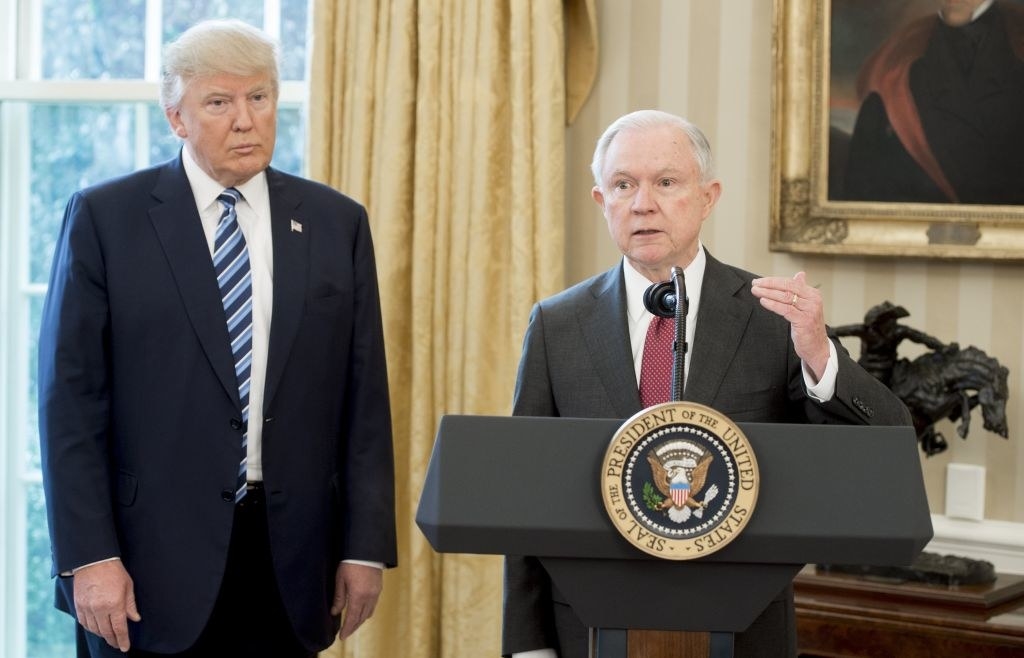
Facing a local crowd of cops and prosecutors in Memphis, Tennessee, last week, Attorney General Jeff Sessions had just started promoting the Trump administration’s new charging policy for criminal defendants when he lifted his eyes from his papers, scanned the room, and veered off script.
The former Alabama senator and US attorney had been slammed from all sides over the harsh sentencing memo he issued on May 10 — not just by Democrats, but by former Republican colleagues in the Senate. Those critics took digs at Sessions for rescinding a popular policy enacted by the Obama administration that helped thousands of nonviolent, lower-tier drug offenders avoid years in mandatory prison terms. The crowd in Tennessee was more receptive to Sessions’ policy positions, bookending his speech with polite claps.
Sessions was resolute in making his case to repeal the old Obama-era rules — as part of the Trump administration's crackdown on criminals — and require that federal prosecutors file charges for the most serious, provable offense in every case.
According to his prepared remarks, Sessions was supposed to say his policy is “not only the right thing to do, it is what the law requires.”
But in a twist, apparently improvising as he addressed the TV cameras, Sessions argued his policy was about guns. He claimed that the Obama administration’s rule had systematically tied the hands of prosecutors from seeking mandatory minimum prison sentences for criminals who carried a firearm.
“I have empowered our prosecutors to once again charge and pursue to the most serious, readily provable offense,” he said, adding, “In my view, it is a violation of the will of Congress to systematically not charge a readily provable offense. So if a prosecutor is directed, as some recent memorandum said, not to bring those cases, it’s really not our role. Congress has said that if you carry a gun in the commission of a crime, you are subject to 5 years in jail.”
There may be time where seeking a lighter penalty is necessary, Sessions said, but added, “It certainly shouldn’t be the policy of us to do that in normal cases.”
“I think Sessions brings guns into this because guns scare people."
The Justice Department confirmed that gun talk wasn’t in the prepared remarks, and it made for a compelling argument. But it’s not clear federal prosecutors had actually interpreted the Obama-era policy as instructions to avoid mandatory minimums for people who carried a gun during a crime.
“It’s dishonest to say this,” Jenny Durkan, who served as a US Attorney under Obama from 2009 to 2014, told BuzzFeed News.
Durkan was the top prosecutor for the Western District of Washington when former Attorney General Eric Holder issued his sentencing memo in 2013. And Holder didn’t talk about avoiding mandatory minimums for crimes committed with a gun. Quite the opposite. Holder’s 2013 memorandum said prosecutors could only sidestep charges that trigger mandatory minimums in drug cases when “the defendant’s relevant conduct does not involve...the possession of a weapon.”
Both before and after that decree, Durkan oversaw rafts of gun and drug cases, including a deluge of traffickers coming over the Canadian border from British Columbia.
“Every prosecutor I knew used gun crimes and mandatory minimums to make their communities safe, and nothing in the Holder memo stopped them,” she said. “Holder supported and encouraged us to prosecute and target violent crimes and guns.”
“During the Holder years, there were a number of crime efforts that targeted guns specifically,” she added, “and no prosecutor was ever restrained by the Holder memo.”

Prosecutors did abide by Holder’s mandate to avoid lengthy drug sentences in certain cases, such as nonviolent offenses committed by people with no significant ties to drug rings — because, as Durkan put it, mandatory minimums had a history of disportionately jailing people of color and the poor.
And with the public, those sentences are unpopular. In 2016, the Mellman Group and Public Opinion Strategies conducted a poll that found that 79% of American voters support flushing mandatory minimums for drug cases, saying the length of the prison term should be left up to judges. Other polls have yielded similar numbers.
“I think Sessions brings guns into this because guns scare people,” Durkan said.
An official for the Justice Department, who asked not to be named, defended Sessions’s gun comments in Memphis, pointing out that the Holder memo of 2013 has other sections. While one part required prosecutors to avoid mandatory minimums in some drug cases, another section granted prosecutorial discretion in a broad sense. That section told prosecutors they should ordinarily bring the most serious charges, but also make an “individualized assessment” and “fairly represent the defendant's criminal conduct.”
The Justice Department official said that because prosecutors had that discretion in general, the Obama administration systemically did not bring the most serious charges in every single case. As such, the official concluded, it could have applied to gun crimes.
But the official did not cite any example of a federal prosecutor using the 2013 policy to decline charges for a mandatory minimum sentence against a person who committed a crime with a gun.
A Justice Department official said that because prosecutors had that discretion in general, it could have applied to gun crimes.
Durkan, the former US attorney, said she didn’t know of any federal prosecutor declining to seek mandatory minimum gun charge because of the Holder memo, either.
“I don’t know whether that happened or not,” she said, adding that prosecutors have always found creative ways to bring lesser charges against less serious offenders. “There could be circumstances where a prosecutor decides to charge in a way that doesn’t invoke the mandatory minimum, but they did that before the Holder memo.”
In the same speech last week, Sessions made the bigger point that drug trafficking often begets violence — and can involve guns. “You can’t go to court to sue for a drug debt,” he said. “So they pack heat and people are killed and a lot of these deaths are clearly a product of drug distribution networks and and gangs and disputes that occur within them.”
“As violent crime has surged and overdose deaths has spiked, federal gun and drug prosecutions fell in recent years,” he added, back on script. “We are going to reverse that trend. This new charging and sentencing policy is a return to solid enforcement that we have had for many years at the Department of Justice.”
The bigger issue, according to Durkan, is that Sessions doesn’t trust his prosecutors or acknowledge that they have always employed discretion to charge — and not charge — defendants, regardless of who is attorney general, in order to focus on the most egregious offenders.
“I just think that shows incredible ignorance about what agents and prosecutors face in the range of cases they deal with,” she said. “Our prosecutors and incarceration resources are not unlimited, and we have to focus them on the worst of the worst.”
“It demonstrates it’s been a long time since Jeff Sessions stepped into a courtroom and had to do these kind of cases.”

